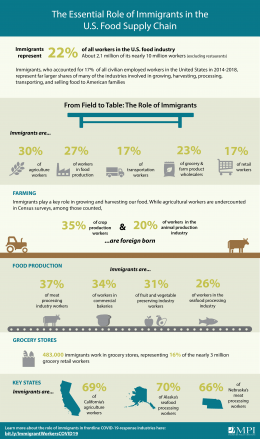Immigrant Workers: Vital to the U.S. COVID-19 Response, Disproportionately Vulnerable
Six million immigrant workers are at the frontlines of keeping U.S. residents healthy and fed during the COVID-19 pandemic. While the foreign born represented 17 percent of the 156 million civilians working in 2018, they account for larger shares in coronavirus-response frontline occupations: 29 percent of all physicians and 38 percent of home health aides, for example. They also represent significant shares of workers cleaning hospital rooms, staffing grocery stores, and producing food.
The foreign born also are over-represented in sectors most immediately devastated by mass layoffs: Restaurants and hotels, office cleaning services, and in-home child care, among them. All told, another 6 million immigrants work in industries that MPI has identified as some of the hardest hit, meaning that collectively 12 million immigrant workers are at the leading edge of the response to and impacts from the pandemic.
As dramatic economic contraction brings hardship to tens of millions in the coming months, the difficulties will be exacerbated for many immigrant workers because of limited access to safety-net systems and to federal relief, both for those who are unauthorized and some who are legally present. The estimated $2 trillion pandemic aid package makes many immigrants eligible for cash relief payments; others, such as most U.S.-citizen or legal immigrant spouses who file taxes jointly with unauthorized immigrants, will not be eligible.
Noncitizens also face restricted access to existing safety-net programs. While green-card holders, those on a temporary work visa, and individuals with Temporary Protected Status or Deferred Action for Childhood Arrivals can access unemployment insurance, most noncitizens cannot turn to the federal, means-tested benefits, including food stamps, that other workers tap in times of need. And immigrant workers face additional vulnerabilities, including smaller incomes and lower rates of health insurance coverage.
1 Immigrant Workers in Industries Vital to Pandemic Response
A. Health Care
B. Essential Retail and Wholesale: Grocery Stores, Pharmacies, and Food Wholesalers
C. Manufacturing
D. Agriculture, Forestry, Fishing, and Hunting
2 Immigrant Representation in Hard-Hit Industries
A. Accommodation and Food Services
B. Personal Services and Private Households
C. Building Services
3 In Hard-Hit Industries, Immigrants Are More Vulnerable
4 Conclusion





